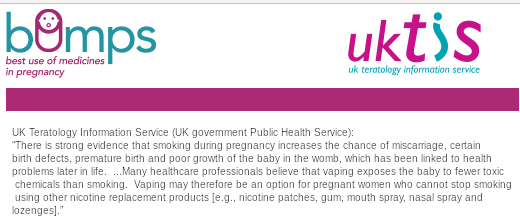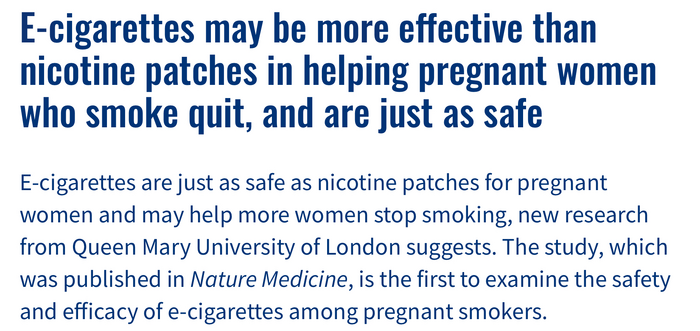ENDS Pregnancy
Jump to navigation
Jump to search

Studies, Surveys, Papers, and Case Studies
- Sometimes it's necessary to view the PDF version to access the full study.
- This page is for referencing the possible benefits of ENDS products vs. smoking cigarettes for Pregnant women. (Electronic Nicotine Delivery Systems are also known as vapor technology, ecigarettes, ecigs, EVP, etc.)
- If you'd prefer someone else to add a study to a topic, there is a subject section called "Suggested studies to add to this page". You may put the link in that section for one of the regular page editors to address.
- If you'd like to help add content to this page, please see the directions at the bottom of the page.
- Full version (open access)
- Conclusions: Regular use of e-cigarettes or nicotine patches by pregnant smokers does not appear to be associated with any adverse outcomes.
- Setting 23 hospitals in England and a stop-smoking service in Scotland. Participants 1,140 pregnant smokers.
- Pesola, F; Myers Smith, K; Phillips-Waller, A; Przulj, D; Griffiths, C; Walton, R; McRobbie, H; Coleman, T; Lewis, S; Ussher, MH; et al.
- Funding source: 15/57/85 National Institute for Health and Care Research. http://dx.doi.org/10.13039/501100000272
2024: Expert reaction to above
- “This paper presents high quality evidence, as a secondary analysis of data from the first UK trial of e-cigarettes for smoking cessation during pregnancy."
- “It is really reassuring that people who quit smoking using an e-cigarette during pregnancy in this study had better pregnancy outcomes than women who continued to smoke tobacco, and did not have any worse outcomes than people who do not smoke at all. This provides reassurance of the safety of e cigarettes for smoking cessation during pregnancy. NRT is already recommended for use during pregnancy for smoking cessation. The findings of this study suggest that e cigarettes do not differ in safety profile from NRT. My reading of this evidence is that e-cigarettes could be viewed as a form of NRT and also can be recommended for smoking cessation to pregnant women, especially as tobacco smoking is so damaging.”
- “An earlier analysis of this trial found a similar safety profile between those who were randomly given e-cigarettes compared with those given nicotine replacement therapy to quit smoking, but this may have resulted from a difference in the actual usage of the two products. This new study analysed the comparative safety based on their actual use, although this meant the two groups were no longer randomly selected. Taken together, the similar sets of results across the two different approaches are reassuring.”
- Przulj D, Pesola F, Myers Smith K, McRobbie H, Coleman T, Lewis S, et al. Helping pregnant smokers quit: a multicentre randomised controlled trial of electronic cigarettes versus nicotine replacement therapy. Health Technol Assess 2023;27(13)
- Rates of adverse events and adverse birth outcomes were similar in the two study arms, apart from participants in the e-cigarette arm having fewer infants with low birthweight (<2500 g) (9.6% vs. 14.8%, risk ratio = 0.65, 95% confidence interval 0.47 to 0.90; Bayes factor = 10.3)
- At end of pregnancy, 33.8% versus 5.6% of participants were using their allocated product in the e-cigarettes versus nicotine patches arm (risk ratio = 6.01, 95% confidence interval 4.21 to 8.58). Regular use of e-cigarettes in the nicotine patches arm was more common than use of nicotine replacement products in the e-cigarette arm (17.8% vs. 2.8%).
- Only 55% of self-reported abstainers mailed back useable saliva samples. Due to this, validated sustained abstinence rates were low (6.8% vs. 4.4% in the e-cigarettes and nicotine patches arms, respectively, risk ratio = 1.55, 95% confidence interval 0.95 to 2.53; Bayes factor = 2.7). In a pre-specified sensitivity analysis that excluded abstainers using non-allocated products, the difference became significant (6.8% vs. 3.6%, risk ratio = 1.93, 95% confidence interval 1.14 to 3.26; Bayes factor = 10). Almost a third of the sample did not set a target quit date and the uptake of support calls was low, as was the initial product use.
- The finding of better use of e-cigarettes tallies with e-cigarettes being a more popular aid to stopping smoking than NRT among people who smoke at the population level. It is worth noting that although the cost to participants was higher for e-cigarettes, the cost to treatment providers was higher for NRT.
- The findings do not suggest that e-cigarette use in pregnancy poses larger risks than the use of NRT, despite the fact that e-cigarettes were more likely to be used and were used for longer periods than NRT.
- This review demonstrates that the evidence does not support denying pregnant women the use of smoke-free products if the alternative is that she would continue to smoke.
- Smoking in pregnancy causes considerable harm, including increased risk of low birthweight, preterm delivery and stillbirth. Positive beliefs about vaping, particularly in comparison to smoking and becoming a confident vaper, were viewed as ways to overcome potential or experienced barriers to vaping. Our research findings may help develop interventions to assist women who have tried to stop smoking but have not quit and would otherwise continue to smoke during pregnancy.
- These findings suggest that vapers during pregnancy had similar risk of preterm as non-users but still had elevated risk for restricted fetal growth.
- The birthweight of infants born to EC users is similar to that of non‐smokers, and significantly greater than cigarette smokers. Dual users of both cigarettes and EC have a birthweight similar to that of smokers.
2019: Electronic cigarette use in pregnancy is not associated with low birth weight or preterm delivery
- Infants born to users of electronic cigarettes had a mean birth weight of (3482g), which was similar to non-smokers (3471g) and significantly greater than that of smokers (3166g).
2019: E-cigarette minimum legal sale age laws and traditional cigarette use among rural pregnant teenagers
- E-cigarette Regulations Increase Prenatal Cigarette Use Among Teen Smokers, Study Shows (Article) Teenagers under 18 could legally purchase e-cigarettes until states passed minimum legal sale age laws. These laws may have curtailed teenagers' use of e-cigarettes for smoking cessation. These results suggest that the laws reduced cigarette smoking cessation during pregnancy rather than causing new cigarette smoking initiation. Our results may indicate an unmet need for assistance with smoking cessation among pregnant teenagers.
- We show that e-cigarette taxes increase pre-pregnancy smoking, increase prenatal smoking, and lower smoking cessation during pregnancy. These findings imply that e-cigarettes and traditional cigarettes are substitutes among pregnant women.
- PDF Version
- Citation: The Effect of E-Cigarette Taxes on Pre-Pregnancy and Prenatal Smoking, and Birth Outcomes - Rahi Abouk, Scott Adams, Bo Feng, Johanna Catherine Maclean, and Michael F. Pesko, NBER Working Paper No. 26126, July 2019, JEL No. I12
- Acknowledgements: Research reported in this publication was supported by the National Institute on Drug Abuse of the National Institutes of Health under Award Number R01DA045016 (PI: Michael Pesko).
- (Article) The effect of e-cigarette indoor vaping restrictions on adult prenatal smoking and birth outcomes (Study) (Must pay to view whole study or PDF) Our panel model results suggest that adoption of a comprehensive indoor vaping restriction increased prenatal smoking by 2.0 percentage points. Places with indoor e-cigarette restrictions slowed the downward trend in tobacco cigarette use in pregnant women by 30 percent compared to places with no e-cigarette restrictions.
- The study also shows that electronic cigarettes are commonly used as a smoking cessation aid in women of reproductive age. The greater likelihood of electronic cigarette use compared to proven adjunctive smoking treatments suggests that electronic cigarettes should be examined as a potential aid to cessation in this population.
See Also
![“All midwives and maternity support workers should be confident and competent in discussing smoking in pregnancy. Nicotine Replacement Therapy [e.g., nicotine patches, nicotine gum] is safe in pregnancy and should be provided in line with evidence-based protocols to women and their partners. E-cigarettes contain some toxins, but at far lower levels than found in tobacco smoke. If a pregnant woman who has been smoking chooses to use an e-cigarette (vaping) and it helps her to quit smoking and stay smokefree, she should be supported to do so. If a woman has switched completely to vaping and is not smoking at all, she should be recorded as a non-smoker. Based on the available evidence on e-cigarette safety, there is no reason to believe that use of an e-cigarette has any adverse effect on breastfeeding.”](/mediawiki/images/thumb/5/57/RCoM.png/700px-RCoM.png)
https://www.rcm.org.uk/media/3394/support-to-quit-smoking-in-pregnancy.pdf

https://www.medicinesinpregnancy.org/Medicine--pregnancy/E-cigarettes/#
News items:

PAGE EDITORS - Please only add Studies, Surveys, Papers in this format to keep page organized
- Topic
- Year (list new to old) Name of Study (In link format to the study)
- Note here if animal study (leave blank if not)
- Brief Summary
- Link to PDF Version
- Citation
- Acknowledgements (funded by, helped by)
- Keywords
- Other
Suggested studies to add to this page
- According to the results: 40.91% of the women who smoked combustible cigarettes decided to keep on smoking and 59.09% decided to quit, 16.67% of participants who use heated tobacco cigarette decided to continue during pregnancy and the remaining 83.33% decide to stop; lastly, there is a condition of fairness for adults who use e-cigarette, 50% decided to continue smoking during pregnancy and the other 50% decided to stop smoking.
- The data indicate that those who continue to smoke during pregnancy are participants who smoke combustible cigarettes, stating that they reduce the amount of smoke inhaled. Meanwhile, participants who use heated tobacco cigarettes or e-cigarettes are certain that they pose less risk than combustible cigarettes; nevertheless, most of them decide to quit smoking during pregnancy.
- Another important aspect that has been noted is that of formal abandonment treatments, as quite unexpectedly, there has been a unanimous recognition of strong distrust toward the possible risks to the unborn child. There is a lot of distrust and little knowledge of official smoking cessation therapies, and because of this, participants stated that they can quit smoking whenever they want and only with their own willpower.
- Human Study
- Maglia M, Quattropani MC, Polosa R, Panassidi A, Caruso M, Mangione M, Nicolosi V, Mazzeppi SD, Lenzo V, Sardella A, Caponnetto P. J Addict Dis. 2023 Mar 9:1-11. doi: 10.1080/10550887.2023.2184302. Online ahead of print. PMID: 36892131
- Poor adherence to Nicotine Replacement Therapy (NRT) in pregnancy may result from low perceived need and/or concerns about consequences; interventions challenging these beliefs may yield higher smoking cessation rates. To evaluate an NRT adherence intervention informed by the Necessities and Concerns Framework, we developed the NRT in Pregnancy Necessities and Concerns Questionnaire (NiP-NCQ).
- Q: Asked by Clive Bates: What can be done to help women use cleaner nicotine (NRT) during pregnancy?
- Emery J, McDaid L, Coleman T, Cooper S, Thomson R, Kinahan-Goodwin D, Dickinson A, Phillips L, Clark M, Bowker K, Brown E, Naughton F. Nicotine Tob Res. 2023 Mar 2:ntad030. doi: 10.1093/ntr/ntad030. Online ahead of print. PMID: 36861351
- Jamie Hartmann-Boyce Nicola Lindson Ailsa R Butler Hayden McRobbie Chris Bullen Rachna Begh Annika Theodoulou Caitlin Notley Nancy A Rigotti Tari Turner Thomas R Fanshawe Peter Hajek https://doi.org/10.1002/14651858.CD010216.pub7
- Living review
- Electronic cigarettes (ECs) are handheld electronic vaping devices which produce an aerosol by heating an e‐liquid. Some people who smoke use ECs to stop or reduce smoking, although some organizations, advocacy groups and policymakers have discouraged this, citing lack of evidence of efficacy and safety. People who smoke, healthcare providers and regulators want to know if ECs can help people quit smoking, and if they are safe to use for this purpose. This is a review update conducted as part of a living systematic review.
- Check page for link to latest publication.